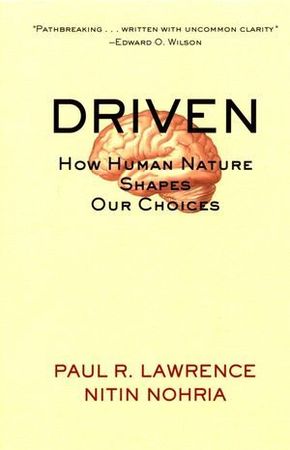Driven - How Human Nature Shapes Our Choices
| Verlag | Wiley & Sons |
| Auflage | 2002 |
| Seiten | 352 |
| Format | 15,1 x 23,0 x 2,3 cm |
| Gewicht | 572 g |
| Artikeltyp | Englisches Buch |
| Reihe | J-B Warren Bennis Series |
| EAN | 9780787963859 |
| Bestell-Nr | 78796385EA |
"Driven" ist ein ganz erstaunliches und provozierendes Buch. Zwei Professoren der Harvard Business School fassen hier die Gedanken der letzten 200 Jahre sowie die neuesten wissenschaftlichen Erkenntnisse zusammen, um eine ganz neue Theorie über das Wesen des Menschen aufzustellen. Sie veranlassen den Leser, vier voneinander getrennte und verschiedenen emotionale Triebe zu untersuchen, die sein Verhalten lenken und seine Entscheidungen beeinflussen - nämlich den Erwerbstrieb, den Bindungstrieb, den Lerntrieb und den Schutztrieb. Dabei konzentrieren die Professoren ihre Studien auf den wohl faszinierendsten Schauplatz menschlichen Verhaltens - den Arbeitsplatz. Durch die Kombination von Bio- und Sozialwissenschaften wird viel Aufschlussreiches und Interessantes über das menschliche Verhalten zu Tage gefördert. So, wie der technologische Fortschritt wesentlich für das 20 Jahrhundert war, so werden - nach Meinung der Autoren - die Fortschritte der Biowissenschaften maßgeblich für das 21. Jahrhundert sein.
In this book--a part of the prestigious Warren Bennis Signature Series--the authors reveal the way people behave in the most fascinating setting of human behavior: the workplace. Driven bridges the gap between the latest findings from evolutionary biology and insights about humanity derived from the social sciences.
A touchstone for understanding how we behave on the job
"This is a stimulating and provocative book in bringing together important ideas from different fields, and, thereby, giving us a whole new slant on 'human nature.'" --Edgar H. Schein, Sloan Fellows Professor of Management Emeritus and Senior Lecturer, MIT
In this astonishing, provocative, and solidly researched book, two Harvard Business School professors synthesize 200 years of thought along with the latest research drawn from the biological and social sciences to propose a new theory, a unified synthesis of human nature. Paul Lawrence and Nitin Nohria have studied the way people behave in that most fascinating arena of human behavior-the workplace-and from their work they produce a book that examines the four separate and distinct emotive drives that guide human behavior and influence the choices people make: the drives to acquire, bond, learn, and defend. They ultimately show that, just as advances in info rmation technology have spurred the New Economy in the last quarter of the twentieth century, current advances in biology will be the key to understanding humans and organizations in the new millennium.

